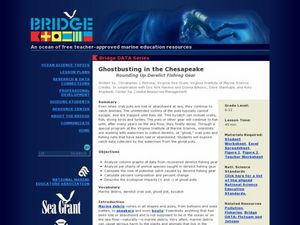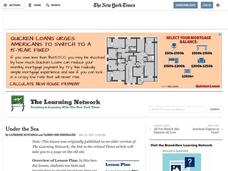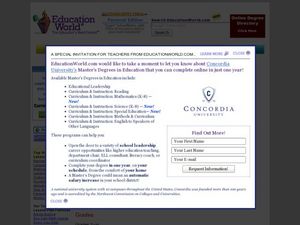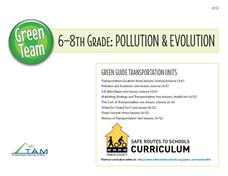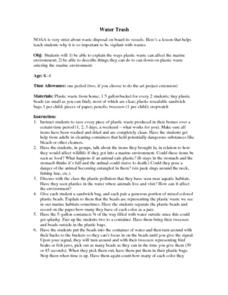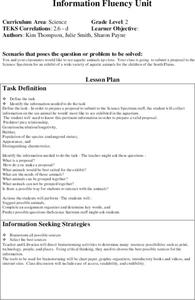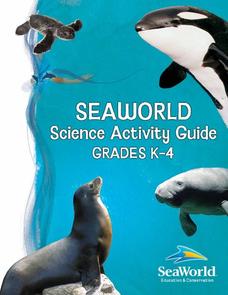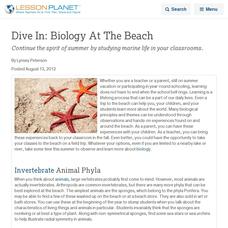Curated OER
Ghostbusting in the Chesapeake
Ghost pots, fishing gear lost during crabbing expeditions, continue to trap crabs that are never collected. Increase your budding ecologists' awareness of human impact on the environment as well as conservation efforts using this...
Curated OER
Under the Sea
Learners imagine and describe fictitious sea animals that might live in the ocean. After reading an article, they reflect on new discoveries found in the ocean recently. Using the internet, they research the interdependence of animals...
National Geographic
Rescuing, Relocating, and Rehabilitating Wildlife
Bring up the Deepwater Horizon (BP) oil spill that occurred in the Gulf of Mexico in 2010. Display the colorful diagram of the coastal and marine organisms living in the area. Show a video about relocating the eggs of the Gulf's sea...
National Wildlife Federation
Penguin Fun Facts
What's black and white and can dive up to 1,800 feet under water? That's right, penguins! Learn this and many other amazing facts about these unique birds with this handy reference sheet.
McGraw Hill
Arthropods
Are spiders related to crabs? Study the order of arthropods with a reading selection about animal diversity. It provides details about each class within the order, as well as vivid pictures and explanatory charts.
Curated OER
Ocean Word and Picture Matching
Students draw a line from 6 ocean animal names to their matching ocean life pictures on the right of the worksheet. This matching worksheet allows young students to work on an important visual skill.
Curated OER
Blue Planet: Tidal Seas
Students investigate how tides affect sea life. In this video based lesson, students view a video on how tides affect sea life. They do web-based research to find the answers to a series of questions and then play Tidal Trivia to test...
Curated OER
Animal Sorting & Matching
In this animal sorting worksheet, 5th graders first match animal pictures with their names and a fun fact. Students must then fill in 15 blanks based on information given on the matching cards.
Curated OER
Baby Animals Debut at Zoos
Students determine the names of animal babies, then read a news article about zoo's experiencing animal births. In this current events lesson, the teacher introduces the article with vocabulary activities, then students read the news...
Curated OER
Creatures of the Sea
Fourth graders complete a two-month long unit on the physical characteristics of the oceans and animal environments. They create a "Creatures of the Sea" alphabet book in collaboration with a kindergarten class, conduct Internet...
Curated OER
Mollusks
In this mollusks instructional activity, students color several figures and label them with the correct parts. They complete 14 short answer questions related to mollusks.
Curated OER
Find the Ocean Animal Words
In this ocean animal words worksheet, students define, discuss, locate and circle six key words associated with ocean animals: fish, whale, dolphin, crab, shrimp and shark,
Safe Routes to School
Pollution & Evolution
Bring together a study of two major scientific topics with a lesson on the relationship between pollution and evolution. With the help of a PowerPoint presentation, hands-on activity. and class demonstration young scientists learn...
Curated OER
Marine & Aquatic Habitats Activities - Walk in the Wetlands
Students research various types of fresh water wetlands and identify the common animal and plant life in these different ecosystems. They further analyze the need to protect these wetlands and explore their varied uses.
Curated OER
Temporary Zooplankton Mix and Match
In this plankton instructional activity, students draw a line between the larvae and the adult. Students write the name of each adult animal under the 8 drawings.
Curated OER
Getting Food
Students explore seashore ecosystems. In this marine animal biology lesson, students sort photographs of various sea creatures according to their eating habits and discuss each animal's identifiable traits. Students draw and...
Curated OER
Water Trash
Students explain the ways plastic waste can affect the marine environment. They are able to describe things they can do to can down on plastic waste entering the marine environment.
Curated OER
Information Fluency Unit
Second graders create a proposal for the Science Spectrum to have an exhibit of a wide variety of aquatic animals for the children of the South Plains. These students would like to see aquatic animals up close.
California Academy of Science
Coral Reef Habitat Match
Different animals live in different habitats, and each animal has specifically adaptive traits that make them tailor-made for their environments. This is true on land and in the ocean. Little ones examine how various marine animals have...
Sea World
Seaworld Science Activity
A fun collection of activities about marine life would be a great addition to your elementary science unit. From cute penguins to scary sharks, the unit features crafts, experiments, and basic research projects that will teach your...
Curated OER
Blue Crabs - The Blue Crab's Chesapeake Journey
A plethora of information about the blue crabs of Chesapeake Bay will amaze and delight your marine biologists. They learn, through direct instruction, about the characteristics and life cycle of this fascinating arthropod. A highlight...
Curated OER
Dive In: Biology At The Beach
Continue the spirit of summer by studying marine life in your classrooms.
Curated OER
You Are What You Eat: Plastics and Marine Life
Students study the different types of plastics and see which ones sink or remain buoyant. In this ocean environmental lesson students complete several handouts, and view a film on PBS.
Curated OER
Secrets of the Ocean Realm - Survival in the Sea
Students determine the sequential links in a marine food chain and identify the roles that various organisms play in this chain. Students develop charts as visual aids for illustrating marine food chains.
Other popular searches
- Land Animals Sea Animals
- Marine Animal Reproduction
- Marine Animal Taxonomy Game
- Marine Animal Games
- Marine Animal Life
- Marine Animal Adaptations
- Marine Animal Classification


